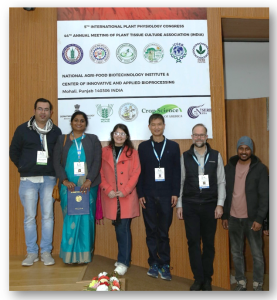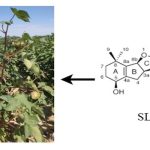iFANS 2023: Time to Talk About Nutrition Security
The International Conference on Food And Nutritional Security (iFANS 2023) was held January 6-9, 2023. It was jointly organized with the 5th International Plant Physiology Congress and the 44th annual meeting of the Plant Tissue Culture Association (India). And it was huge. Imagine an event jointly organized by four research institutes and two national-level societies!
There were about 450 participants including about 110 speakers from 21 countries. The conference’s major theme was preparing for the increasing population with decreasing agricultural land while fighting against hidden hunger.
Notable Talks by Prominent Scientists
 A highlight of Day 1 was a “meet the editors” session, which was addressed by ASPB CEO Crispin Taylor, Editor-in-Chief of The Plant Cell Blake C. Meyers, Editor-in-Chief of Plant Physiology Yunde Zhao, and Christine H. Foyer of Food and Energy Security.
A highlight of Day 1 was a “meet the editors” session, which was addressed by ASPB CEO Crispin Taylor, Editor-in-Chief of The Plant Cell Blake C. Meyers, Editor-in-Chief of Plant Physiology Yunde Zhao, and Christine H. Foyer of Food and Energy Security.
All the talks were excellent, but a few of those I found exceptional likely due to my area of interest. The first scientific speaker at the conference was Yunde Zhao. He showed how his beautiful Ruby-based constructs can be used for selected transformants and replace the application of antibiotics in plant transformation. He also showed how his gene-edited rice lines can also be used to ease the process of hybrid rice production. Dr Rajendra Singh Paroda also gave an enlightening talk where he explained the growth of Indian agriculture since the start of the green revolution.
David Edwards emphasized how Pangenome analysis is helping to better correlate genotype-phenotype interaction. Rajiv Varshney emphasized how large-scale genomics and a fast-forward breeding approach can help integrate traits into the crop of interest. Alok Sinha spoke on how MAP kinases play a role in signaling activated after the perception of light. Raman M. Sundaram highlighted various famous rice varieties developed by his institute IIRR and emphasized the benefits of collaborative efforts.
The conference also included many senior researchers who have developed varieties that are significantly contributing to nations’ food supplies.
The conference also included the felicitation of Dr. Sudhir K Sopory, one of the most decorated plant biologists in India. A session was also dedicated to the memory of Prof J. P. Khurana, an exceptional teacher and plant biology researcher, who left this world in 2021. Dr. Khurana has taught hundreds if not thousands of plant scientists in India.
An Early-Career Perspective
iFANS featured two sessions dedicated to young researchers along with an excellent networking opportunity to meet plant biologists working on different crops and addressing different types of problems on the ground.
Another interesting point to note was that most of the speakers summarized not just one recent study—they briefly summarized their lab history of the last few decades and went on to emphasize recent findings. As an early-career researcher, I felt that this approach provided a longer-term perspective of how labs move with time.
I also observed a major difference between most of the conferences I have attended in the US and Europe vs conferences in India: The work in India is breeding-centric, so most speakers will share work derived from breeding leading to novel findings or products.
Overall, it was a unique opportunity to meet and interact not just with almost all eminent plant biologists of India, but also meet young researchers who will shape the future of agriculture in India.
______________________________________________
About the Author:
Kamal Kumar Malukani is currently a research associate at TIGS, Bengaluru, and a 2022 Plantae Fellow. His research is in plant biofortification with a focus on generating rice mutant lines that exhibit higher nutrition values in the grains. You can find him on Twitter at @KamalMalukani.



